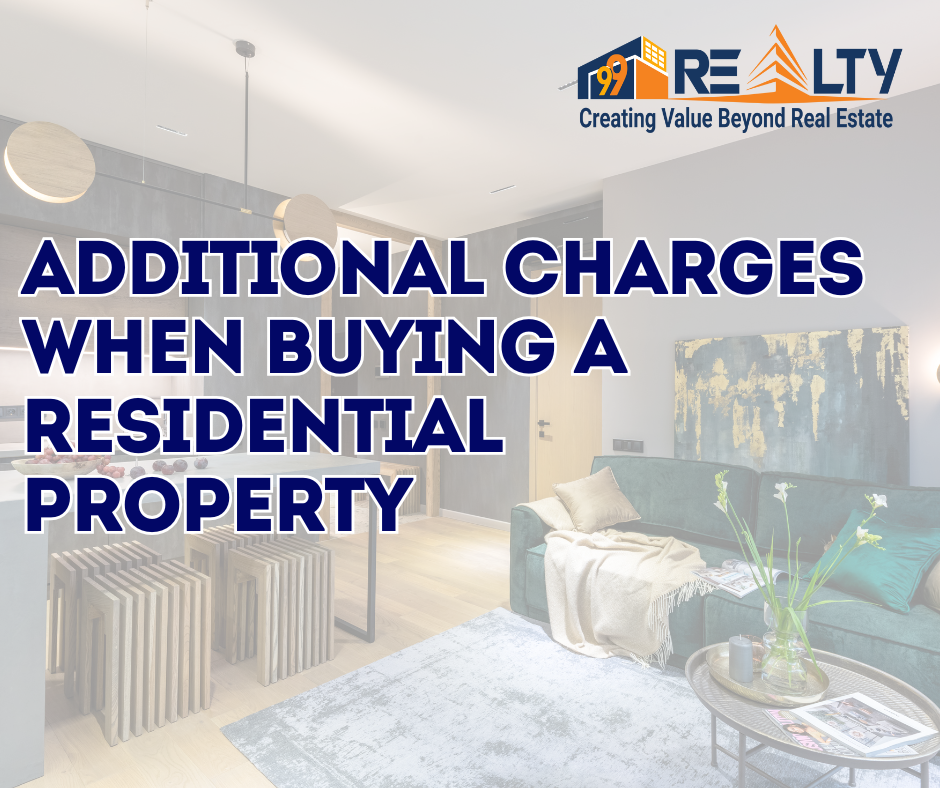When purchasing a residential property, the Base Selling Price (BSP) is just the starting point. Developers add various other charges to cover amenities, infrastructure, and legal requirements, often increasing the total cost significantly. Here’s an overview of these additional charges:
1. Development Charges (DC)
Development charges are levied to cover the cost of infrastructure and facilities such as roads, sewage systems, electricity, and water supply within the project.
- Example: ₹50-100 per sq. ft.
- Often divided into internal (within the project) and external (beyond the project boundary) development costs.
2. Legal and Documentation Charges
These include fees for preparing the sale agreement, registration documents, and legal verification.
- Typical Costs: ₹10,000 to ₹50,000, depending on the complexity and location.
- Covers title verification, stamp duty, and registration processes.
3. Car Parking Charges
Parking spaces are sold as separate units or included in the overall pricing. Developers charge for reserved spots in open areas, stilt, or basements.
- Cost Range: ₹1,50,000 to ₹5,00,000 or more per parking slot.
- Clarify whether it is a covered or uncovered parking space.
4. FFC (Fire Fighting Charges)
Fire Fighting Charges are collected to cover the installation and maintenance of fire safety equipment, including alarms, sprinklers, and extinguishers.
- Cost Range: ₹50-100 per sq. ft., depending on building regulations.
- Mandatory as per fire safety laws in high-rise buildings.
5. EEC (External Electrification Charges)
These charges cover the installation of transformers, substations, and cabling required to bring electricity to the project.
- Cost Range: ₹40-100 per sq. ft.
- Paid to local authorities or utility providers.
6. Clubhouse and Amenities Charges
If the project includes facilities like a clubhouse, gym, swimming pool, or landscaped gardens, buyers are charged for their construction and maintenance.
- Typical Cost: ₹50,000 to ₹2,00,000 as a one-time fee.
7. Power Back-Up Charges
These charges cover the cost of generators or inverters for uninterrupted power supply to common areas and individual units.
- Example: ₹25,000 to ₹1,00,000 depending on the capacity provided.
8. Maintenance Charges (Pre-Paid)
Some developers require buyers to pay upfront for 1-2 years of maintenance costs. This covers cleaning, security, and utility services for common areas.
- Cost Range: ₹2-5 per sq. ft. per month.
9. IFMS (Interest-Free Maintenance Security)
This refundable security deposit is collected to ensure maintenance costs for common areas are covered.
- Cost Range: ₹50-100 per sq. ft.
10. Preferential Location Charges (PLC)
As previously discussed, PLC is charged for units in premium locations within the project (e.g., park-facing, corner units, or higher floors).
11. Floor Rise Charges (FRC)
Higher floors are charged a premium based on per-square-foot rates, as explained earlier.
12. Miscellaneous Charges
- Water Connection Charges: For establishing water supply connections to individual units.
- Gas Pipeline Charges: Covers installation of piped gas infrastructure.
- GST and Other Taxes: GST is charged at 1% for affordable housing and 5% for non-affordable housing on under-construction properties.
Tips to Manage Additional Charges
- Request a Detailed Cost Breakdown: Ensure all charges are clearly mentioned in the cost sheet.
- Verify RERA Compliance: Check if the charges comply with the guidelines of the Real Estate Regulatory Authority (RERA).
- Negotiate: Some charges, like parking or maintenance deposits, might be negotiable.
- Understand Refund Policies: Confirm which charges are refundable in case of cancellation.
- Budget Beyond BSP: Allocate at least 20-30% over the BSP for these charges.
The additional charges levied by developers can substantially increase the total cost of a property. These charges can be different from project to project or in different states as per the prevailing local authority guidelines. Being aware of these charges, negotiating where possible, and understanding the legal framework ensures a smooth and transparent home-buying experience. Always clarify all costs upfront and ensure they are documented in the agreement to avoid surprises later.
Subscribe to get updates on our latest posts and market trends.






Join The Discussion